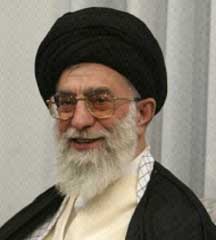VIENNA, (Reuters) – Six world powers demanded Iran keep its promise to let international inspectors visit a military installation where the U.N. nuclear watchdog believes explosives tests geared to developing atomic bombs may have taken place.

The joint call demonstrated unusual unity among the powers on Iran before a planned revival of high-level talks as well as widening disquiet about the nature of Tehran’s nuclear ambitions, with Israel threatening last-ditch military action.
Iran’s Supreme Leader Ayatollah Ali Khamenei welcomed comments by U.S. President Barack Obama about a diplomatic “window of opportunity” offered by the talks, but said Washington’s simultaneous moves to “bring the Iranian people to their knees” with sanctions were driven by delusion.
Heaping pressure on Iran to come clean, the United States, Russia, China, Britain, France and Germany used a U.N. nuclear watchdog governors’ meeting on Thursday to urge Tehran to grant prompt access to its Parchin military facility.
They voiced concern that no deal was reached between Iran and International Atomic Energy Agency (IAEA) inspectors at talks in January and February, “including on the access to relevant sites in Iran, requested by the agency … We urge Iran to fulfil its undertaking to grant access to Parchin.”
The message was reinforced by an unusually blunt statement from IAEA director Yukiya Amano accusing Tehran of seeking to “tie our hands” and restrict inspectors during their last two rounds of meetings.
Iran media reports this week suggested a visit to Parchin might still be granted but the IAEA said yesterday Tehran had not contacted it formally about any trip.
Iran’s IAEA ambassador, Ali Asghar Soltanieh, told reporters outside the board meeting that the suspicions aired about Parchin were “childish” and “ridiculous”. He did not elaborate.
GETTING RID OF
TELLTALE EVIDENCE?
Western diplomats briefed by a senior IAEA official said Iran might be delaying an inspectors’ trip to Parchin so that it could first clear away evidence of research with high explosives tests relevant to designing a nuclear bomb.
They referred to a sequence of satellite pictures of the Parchin complex showing apparent changes to its structure.
The six powers made no mention of “sanitising” the Parchin premises in their statement at a closed-door session of the 35-nation International Atomic Energy Agency governing board.
But their language regarding Parchin and other aspects of Iran’s shadowy nuclear programme sent a message to Tehran of a cohesive stance within the group on how to diplomatically tackle the stand-off, which has stirred fears of war that could inflame the Middle East and send oil prices skyrocketing.
The six powers voiced “regret” about Iran’s escalating campaign to enrich uranium, which can yield material for electricity or nuclear bombs and is now centred in a mountain bunker chosen as protection from air strikes.
Iran, facing sanctions targeting its oil exports for defying international demands to curb its nuclear activities, denies suspicions of a camouflaged attempt to develop atom bombs, insisting it wants nuclear power for electricity generation.
But Israel, seeing Iran’s nuclear advances as a mortal threat, doubts sanctions and diplomacy will rein in its arch-enemy’s nuclear activity and is speaking more stridently of resorting to pre-emptive bombings of Iranian nuclear sites.
Prime Minister Benjamin Netanyahu said Israel would give sanctions on Iran a chance to work and would not attack its nuclear installations in the coming days or weeks.
“I am not standing with a stopwatch in hand. It is not a matter days or weeks, but also not a matter of years. Everybody understands this,” he told commercial Channel 10 in an excerpt from a recorded interview.
Israel, which is believed to harbour the Middle East’s only nuclear arsenal, has asked the United States for advanced “bunker-buster” bombs and refuelling planes that could improve its ability to attack Iran’s underground nuclear sites, an Israeli official said on Thursday.
A U.S. official confirmed Netanyahu and Defense Secretary Leon Panetta discussed military capabilities but said no deals were struck during those talks.
REVIVING BIG POWER
TALKS WITH IRAN
Temporarily quieting the sabre-rattling, the European Union’s foreign policy chief said on Tuesday the six powers had accepted Iran’s offer to revive talks after a year’s standstill.
The Islamic Republic’s chief nuclear negotiator Saeed Jalili last month promised to float “new initiatives” at the talks, whose venue and date are not yet decided.
